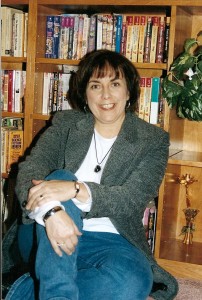 Synopsis:
Synopsis:
The Davidsons are the perfect family. Maggie is a psychology professor at a community college. She and her husband, Mike, have two teenage sons, Brian and Jamie. Brian, the eldest, plays third base on the high school baseball team and dreams of securing a college scholarship. Jamie is 17 and a member of the drama club.
As the story opens, there is tension between Maggie and Mike because she has been gradually pulling away from the Catholic Church. Mike, a staunch believer and follower, believes that his family should worship regularly as a family and adhere to the church’s stance on societal issues, including sexual orientation. He even chairs the parish’s Contemporary Issues Committee. As a psychological professional, however, Maggie, rejects the church’s belief that homosexuality is a sinful lifestyle choice that is subject to change through prayer and reparative therapy.
Maggie has other reasons to reject Catholic dogma. As an eight-year-old child, she was permanently separated from her older sister, Caroline. When Caroline informed her parents that she was going to marry a man who had been divorced, her parents disowned and banished her. For the past thirty-seven years, Maggie has mourned the loss of her big sister and wondered if Caroline’s life turned out the way she hoped it would.
Brian has a long-time girlfriend, and now Jamie is interested in a special someone and wants to begin dating. When he tells Maggie about his “first boyfriend,” his sappy expression causes Maggie’s heart to ache and rejoice all at the same time. And wonder how her husband, who loves his sons as deeply as any father can, will be able to reconcile the news that his son is gay with his single-minded devotion to his church and its teachings.
Review:

Kathryn Shay tackles the story of a young man’s declaration of his sexual orientation and its impact upon his family, friends, and community with sensitivity and compassion. It’s no wonder. Although she says that the story is “very fictionalized with only a few elements of our journey in it,” it is a sojourn with which she is familiar. Her own son came out when he was 17 years old and in the ten years since, she has had time to reflect upon that event and ponder its impact upon her life, as well as that of her family.
“The Perfect Family provided me with a fresh, soulful and enlightening coming out story.”
What is remarkable about The Perfect Family is its lack of villains. Shay has intricately created a cast of multi-faceted characters, each with their own beliefs and viewpoints. Each is, in his/her own unique way, a product of and has spent his/her life reacting to the environment in which he/she was raised. Each character is challenged to examine the things that he/she has always accepted as true. And each is motivated by his/her own capacity to love.
In The Perfect Family the world is composed of myriad shades of gray, but devoid of stark white or pitch black.
Maggie is determined to protect Jamie. She validates his bravery and desire to be a typical high school kid — but is determined to keep her family intact. She understands that sexual orientation is an immutable characteristic, not a choice, and reassures Jamie that she is proud of and supports him. Of course, Maggie sees a counselor to whom she confides her own fears and misgivings, and it is those confessions that make Maggie thoroughly believable and empathetic. Even though she accepts, appreciates, and values Jamie just as he is, her raw, honest emotional reactions elevate her character from a stereotypical crusading mother in a made-for-television movie to a believably conflicted, frightened parent who, above all else, wants her child to be safe and happy.
Maggie’s is the voice of reasoned compassion and unrestrained love that any family dealing with this issue needs to hear loudly and clearly. So it is unfortunate that at times, her dialogue is a bit stilted and almost preachy. It is a minor complaint, to be sure, because those were the only instances when the book’s otherwise taut pace bogged down momentarily.
Mike is a man who has spent his life obeying his church and its teachings, never really questioning either. When Jamie’s sexual orientation forces him to finally confront the doctrine that he has always accepted as true, the foundation upon which he has built his life is shaken. Feeling powerless and knowing that his family is slipping away from him, Mike lashes out. He meets with the father of Jamie’s boyfriend, deliberately prohibiting Maggie from participating in the conversation, and proposes that the boys be sent to reparative therapy, a suggestion so repulsive and abhorrent to Maggie that it nearly cements the destruction of their marriage. He also seeks advice and counsel from the family’s priest — who, in turn, attempts to persuade Maggie that she should not attend any other church lest she encounter false teachings.
Still, under Shay’s carefully nuanced portrayal, there is never a moment of doubt about Mike’s love for Jamie, Brian, and Maggie. There are moments when he is overbearing and boorish, but he is the character readers will find themselves rooting for even though his beliefs may be, as in my case, completely at odds with those of the reader. There is never any question of Mike’s sincerity, and his struggle to understand Jamie and regain equilibrium in his own life, as well as his family’s, feels genuinely torturous.
Brian, always close to his kid brother, reacts in the way many heterosexual male teenagers do: He is repulsed by the physicality of Jamie’s sexual orientation, and concerned about his friends’ and teammates’ reactions. He is angry that Jamie has disrupted their previously easy-going family life and, to some extent, jealous that Jamie’s announcement has drawn attention away from him during his senior year of high school. Brian, like his father, questions his own masculinity and sexuality, ultimately paying a steep price for his need to prove to himself that he is not like his brother.
And then there’s Jamie, flush with the excitement of his first big teenage love. He’s just a normal high school boy who wants to experience all the things kids his age do with their first boyfriend or girlfriend: Meet by his locker between classes, walk down the school hallway holding hands, and attend the prom wearing coordinated ensembles. Any parent who has ever comforted a child who came home from school and reported that their best friend sat by his/her new best friend at lunch, that they were not invited to a classmate’s birthday party, or that they were ridiculed on the playground will feel his/her heart break a little more each time Jamie’s desire to simply fit in with and be like the other kids is thwarted. But Jamie is strong and determined to stand up for himself and Luke, his new boyfriend, even when Luke’s father behaves in a manner as close to villainous as Shay allows.
I wondered how differently the story might have evolved had Brian, the athletic, popular brother come out, rather than Jamie, the introspective dramatist and poet. Still, Luke’s sexuality proved surprising not to just his parents, but also his classmates — he, like Brian, was a member of the high school baseball team. So kudos go to Shay for subtly, but effectively, rejecting the stereotypical characterizations of gay characters that are so common in books, movies, and on television.
When the opportunity arose to read an advance copy of and review The Perfect Family for Pump Up Your Book, I jumped at it. As a civil rights attorney, I wanted to see if Shay would handle the issues presented by the story with sensitivity, grace, and, most importantly, respect for disparate viewpoints. (At the time, I had no knowledge of Shay’s own story.)
Indeed, that is the true beauty and strength of The Perfect Family. The viewpoints and beliefs held at the outset by each character are accorded dignity; Shay’s narrative lacks derision or belittlement. Rather, each character is human and flawed, but trying his/her best to adjust to the fact that the expectations we project upon our loved ones are not always realistic or justified. And by the last page, most of Shay’s characters learn that in order to truly love, you have to be flexible, adaptive, and tolerant — no matter how emotionally, intellectually, philosophically or religiously trying that may be.


11 Comments
[New Post] Book Review: The Perfect Family https://www.jhsiess.com/2010/08/02/book-r…
Janie,
Thank you so much for such a lovely review. The extent to which you examined the book and commented on it were wonderful. And I have to say each compliment brought tears to my eyes. As you obviously know, this was the book of my heart and a labor of love. To see the first review on my Virtual Book Tour be so thorough and positive really means a lot to me. I will keep this and treasure it.
Kathy Shay
@Kathy: It was obvious as I was reading, even though I did not yet know your personal circumstances, that it was a story about which you had very deep feelings. Your commitment to the subject matter was evident on every page. The pain the characters felt — regardless of their beliefs — was palpable and, based upon my experience as a civil rights professional, portrayed with complete accuracy.
I meant what I said about the book being read in classrooms and by parents. And what I should have added was that it should be read in every church in America, not to mention most workplaces, as well. That could lead to understanding and tolerance, if not complete agreement, and save a lot of people from needing the services of folks like me and/or the civil rights enforcement agency where I was employed for 7 years.
Thank you for writing from your heart and with such eloquence.
Pingback: Tweets that mention Book Review: The Perfect Family — Colloquium -- Topsy.com
Sounds like a great read. It’s very difficult for families to get over situations sometimes and simply accept people for who they are unconditionally.
Unconditional love is a wonderful ideal. It’s also, quite often, a fantasy. Seems like every love on the planet has conditions, doesn’t it? People regularly blow apart their whole lives because a relationship doesn’t conform to the conditions they require, or because they expect someone else’s love for them to be truly unconditional NOT MATTER WHAT. I’m looking forward to reading this book now, even though I expect the unconditional love arrived at in the end to be a rarified event, rather than the norm. It’s nice to read about families like this…but they are very atypical, I’m afraid.
This book sounds fantastic! It would be difficult to go out into the world if your own family doesn’t accept you unconditionally.
Pingback: Introducing Blog Carnival
Really sounds fantastic. It’s very difficult for families to get over situations sometimes and simply accept people for who they are unconditionally.
Pingback: West Of Mars — Win A Book! » Blog Archive » The Perfect Family (Autographed)
I am going to go out and get this book and read it. I had really thought that things were getting better out there for gay teens until the recent turn of events. I would like to hold out hope that it is still a minority of folks out there that hold those ignorant views. Ridding our world of such ignorance has to begin in the home by educating our children and teaching them that everyone deserves to live their lives in freedom and respect. After I read your book, I will pass it on to my sixteen year old daughter.